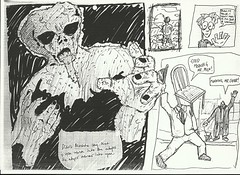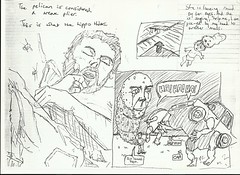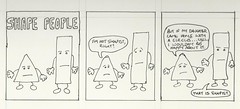
Nazis+Posthuman=Bad News
A forthcoming paper in the journal Ethics, Policy and the Environment entitled “Human Engineering and Climate Change” has recently caused a bit of a hoopla for daring to suggest that the notion of human enhancement deserves “further consideration in the debate about climate change“. The paper includes a disclaimer stating:
To be clear, we shall not argue that human engineering ought to be adopted; such a claim would require far more exposition and argument than we have space for here. Our central aim here is to show that human engineering deserves consideration alongside other solutions in the debate about how to solve the problem of climate change. Also, as we envisage it, human engineering would be a voluntary activity – possibly supported by incentives such as tax breaks or sponsored health care – rather than a coerced, mandatory activity.
Never the less, according to an article in The Grauniad a flurry of hostile reactions to the paper (abetted by an interview in The Atlantic with it’s lead author S. Matthew Liao) ensued:
terms such as “eugenics”, “Nazis” and “eco fascists” were quickly being bandied around. One sceptic blogger said that the “sick” Liao and his co-authors should be “kept in Guantanamo”. Another said the paper “presages the death of science, and indeed the death of reason, in the West”. But prominent environmentalists were also keen to denounce the paper. Bill McKibben tweeted that the paper contained the “worst climate change solutions of all time”. Mark Lynas tweeted that he thought it was an “early April Fool”. It was hard to disagree.
The phrase ‘it was hard to disagree’ at the end there is telling, and invites us to ask why trans/posthumanist ideas are often so quickly dismissed? It is only hard to disagree with the notion of bioengineering humans being an April Fool if it already seems foolish to you. These reactions probably highlight the twin poles of ‘human’ reactions to posthumanity. At one extreme is the tendency to cry ‘eugenics’ and ‘Nazis’; probably, alas, the most well-known instance of human bio-engineeering. This poor public perception will probably continue to affect the public image of Transhumanism in much the same way that David Cronenberg’s The Fly set back Scotland’s burgeoning teleportation industry of the mid-eighties (“Ah’m no getting intae that thing, pal. Have you no seen The Fly?”).
Liao recognises as much himself, telling The Grauniad (in a statement echoed by his co-authors):
the term “eugenics” often gets brought up whenever people mention human enhancements. This is unfortunate because my co-authors and I are positively against any form of coercion of the sort the Nazis had done in the past (segregation, sterilization, and genocide). The way the term ‘eugenics’ is used by some of the people who are against our proposal, it seems that voluntary use of contraception would be a form of eugenics.
The opposite pole, the comedy to the tragedy of eugenics, is mockery. At this end of the spectrum the dream of a posthuman future is science-fiction, the stuff of comic books, ‘an early April Fool’.
How can this image problem be resolved? The sentimental attachment to Humanity (itself of course, but a word and no more, but that’s a post for another day) could turn out to be the death of Humanity. Most people find it easier, if morbidly arousing, to imagine environmental catastrophe and mass extinction than to imagine things getting better, easier, sexier, more brightly coloured. I don’t think it would be too much to say that most people find it difficult to think beyond the human. As Neitzsche, so often ahead of the game, once put it,
Man is something that shall be overcome. What have you done to overcome him?
All beings so far have created something beyond themselves; and do you want to be the ebb of this great flood and even go back to the beasts rather than overcome man? What is the ape to man? A laughingstock or a painful embarrassment. And man shall be just that for the overman: a laughingstock or a painful embarrassment. You have made your way from worm to man, and much in you is still worm. Once you were apes, and even now, too, man is more ape than any ape.
Of course Nietzsche has been often misunderstood and tarred withe Eugenics/Nazi brush himself. Timothy Leary, that other misunderstood philosopher of posthumanity, used to say that “You cannot use butterfly language to communicate with caterpillars.” That those who had unlocked the posthuman circuits of their brain ought to be very careful communicating with those running on the first four ‘terrestrial’ (read ‘human’) circuits. You can read his thoughts on the perils of communicating with what he variously calls ‘larvals’, ‘yokels’ and ‘mundanes’ here (and more about Leary’s 8-Brain model here). Though be warned that if you find yourself feeling patronised or offended by the terms ‘larval’, ‘yokel’ and ‘mundane’ then its possible you are those things. or at least human. And if the idea of being a human makes you feel warm and fuzzy inside then you are almost certainly one.
The point that both Nietzsche and Leary make in their different ways is that it is very difficult for those who have moved beyond simply human concerns to express those posthuman visions in a way that is not either confusing or terrifying to human minds. As Leary puts it, it, “is like discussing sexual experiences with a pre-adolescent. SHe just can’t understand the new reality because Hir neural circuits have not been turned-on. And SHe may turn you in for philosophic child-molesting.” Humans remain as averse to new developments as they have always been (as in this fun list of 10 Science and Technology Breakthroughs That Caused Widespread Panic).
It is not simply a matter of paradigm shifts either. New ideas are psychologically threatening to most humans. In 2010 study at the University of Pennsylvania-titled The Bias Against Creativity: Why People Desire But Reject Creative Ideas– observed reactions to a prototype running shoe that used nanotechnology to keep feet cool and prevent blisters. Despite the advantages of such a sneaker participants displayed both a conscious and unconscious bias towards creativity. The authors write that:
Our findings imply a deep irony. Revealing the existence and nature of a bias against creativity can help explain why people might reject creative ideas and stifle scientific advancements, even in the face of strong intentions to the contrary…Revealing the existence and nature of a bias against creativity can help explain why people might reject creative ideas and stifle scientific advancements, even in the face of strong intentions to the contrary…The field of creativity may need to shift its current focus from identifying how to generate more creative ideas to identify how to help innovative institutions recognize and accept creativity.
They concluded with the following observations:
– Creative ideas are by definition novel, and novelty can trigger feelings of uncertainty that make most people uncomfortable.
– People dismiss creative ideas in favor of ideas that are purely practical — tried and true.
– Objective evidence shoring up the validity of a creative proposal does not motivate people to accept it.
– Anti-creativity bias is so subtle that people are unaware of it, which can interfere with their ability to recognize a creative idea.
This could be a problem for posthumanism. It’s worth noting that for Anders Sandberg, co-author of the human engineering paper and a vocal proponent of Transhumanism, has written on his blog that “The methods we mention are mostly examples and likely *far* too wussy to amount to much. But there might be better methods if we were to investigate them properly. Of course, in the long run I think the real sustainable choice is to become postbiological“. This is perhaps an even more radical proposition that simply bioengineering, which Sandberg argues would be too slow a process anyway. Better to augment out meat-sacks or perhaps shed them completely. At any rate, a postbiological future represents a more radical departure from current humanity than a bioenginnered form of posthumanity. The problem for a posthuman future then is not simply mockery or the specter of eugenics but that an idea like postbiological evolution might simply be beyond the imaginative capacities of most human beings. Of course, a more likely scenario is that a posthuman future would comprise a mix of various types of posthumanity, the postbilogical and the bioengineered working and playing side by side.
That might seem a little harsh but if the choice is between a desire to stay ‘human’ in order to participate in the next great mass extinction event or embrace the posthuman and make it out alive and into the stars then the choice is simple, no? Nothing is holding us back except stupidity and lack of imagination. The concept of ‘Humanity’ has become a prison, setting limits on what we imagine human minds and bodies are capable of doing and becoming. Think about it as Humanity 2.0 if that helps. Every end is a beginning, and all change is loss, but the transition can be quick and relatively painless or it can be slow and hard, or worse, not happen at all.
Postscript: Seeing the above sentence written down like that it is easy to see why some people think of Nazis and eugenics-“ze tranzition cun be quick unt relatively painless or it can be slow unt hard, or vorse, not happen at all”. Doesn’t seem like the best note to end on. Obviously no one is advocating coercion or involuntary enhancement. So, how to ‘sell’ posthumanity? How to make the radically new appear sexy and inviting to a species notoriously given to neophobia? Perhaps a zen approach is best. The first generation to have grown up from birth within the global communication network are now thrashing about in the oxygen of adulthood having emerged from their amniotic cyber-sack. perhaps they will already be primed for these future developments. In fact, given their familiarity with cyber-space we might well ask if they are even human -Homo Sapien or Homo Interneticus?
There, that seems a touch more optimistic.
Goodbye for now.





Leave a comment